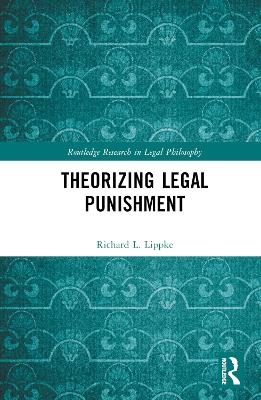
Theorizing Legal Punishment
Seiten
2024
Routledge (Verlag)
978-1-032-66167-4 (ISBN)
Routledge (Verlag)
978-1-032-66167-4 (ISBN)
This book systematically defends an account of the institution of legal punishment that draws on both retributive and crime prevention thinking.
This book systematically defends an account of the institution of legal punishment that draws on both retributive and crime-prevention thinking.
The work argues that legal punishment censures convicted offenders and thus morally communicates with them, any victims, and the broader community, while also serving to reduce future crime. The expressive or retributive element is assigned the lead role in this mixed account because it better captures the notion that members of society are to be held morally accountable for their failures to abide by defensible criminal prohibitions of various kinds. Despite this, it is conceded that the reduction of crime plays a vital role in justifying the institution of legal punishment and the book contains extended discussion of how and why this is so. Beyond its explication of the aims of legal punishment and their respective roles within a mixed theory, the study devotes separate chapters to sentencing, criminal procedure, and the imposition of fees and collateral legal consequences on individuals who have been convicted of crimes and fully served their sentences. In these ways, the work moves beyond discussion of the abstract aims of legal punishment to details of the institution’s internal structure and operations. The many historical deficiencies and failures of the institution are duly noted and the challenges they pose for punishment theorizing are examined.
The book closes with discussion of the limited success of punishment institutions in apprehending, convicting, and punishing those who violate the law, including many who do so in serious ways. Alternatives to reliance on legal punishment institutions are briefly examined. In the end, retention of such institutions is urged although it is suggested that we ought to have modest expectations about their ultimate success. The work will be of interest to those working in the areas of Legal Philosophy and Criminology.
This book systematically defends an account of the institution of legal punishment that draws on both retributive and crime-prevention thinking.
The work argues that legal punishment censures convicted offenders and thus morally communicates with them, any victims, and the broader community, while also serving to reduce future crime. The expressive or retributive element is assigned the lead role in this mixed account because it better captures the notion that members of society are to be held morally accountable for their failures to abide by defensible criminal prohibitions of various kinds. Despite this, it is conceded that the reduction of crime plays a vital role in justifying the institution of legal punishment and the book contains extended discussion of how and why this is so. Beyond its explication of the aims of legal punishment and their respective roles within a mixed theory, the study devotes separate chapters to sentencing, criminal procedure, and the imposition of fees and collateral legal consequences on individuals who have been convicted of crimes and fully served their sentences. In these ways, the work moves beyond discussion of the abstract aims of legal punishment to details of the institution’s internal structure and operations. The many historical deficiencies and failures of the institution are duly noted and the challenges they pose for punishment theorizing are examined.
The book closes with discussion of the limited success of punishment institutions in apprehending, convicting, and punishing those who violate the law, including many who do so in serious ways. Alternatives to reliance on legal punishment institutions are briefly examined. In the end, retention of such institutions is urged although it is suggested that we ought to have modest expectations about their ultimate success. The work will be of interest to those working in the areas of Legal Philosophy and Criminology.
Richard L. Lippke is emeritus professor of criminal justice at Indiana University-Bloomington. He is the author of four books and 75 published articles or book chapters.
Acknowledgments vi
Introduction 1
1 Legal Punishment and Crime Reduction: A Reassessment 10
2 In Search of the Retributive Element 33
3 Punishment and Moral Communication 57
4 Merging the Elements 91
5 Criminal Procedure and the Moral Authority to Punish 121
6 A Mixed Theory of Sentencing 148
7 User Fees and Collateral Legal Consequences 179
8 Toward Realism about the Prospects of State
Punishment 209
Bibliography 236
Index 253
| Erscheinungsdatum | 08.02.2024 |
|---|---|
| Reihe/Serie | Routledge Research in Legal Philosophy |
| Verlagsort | London |
| Sprache | englisch |
| Maße | 156 x 234 mm |
| Gewicht | 644 g |
| Themenwelt | Geisteswissenschaften ► Philosophie |
| Recht / Steuern ► Allgemeines / Lexika | |
| Recht / Steuern ► EU / Internationales Recht | |
| Recht / Steuern ► Strafrecht ► Kriminologie | |
| Recht / Steuern ► Strafrecht ► Strafverfahrensrecht | |
| Sozialwissenschaften | |
| ISBN-10 | 1-032-66167-4 / 1032661674 |
| ISBN-13 | 978-1-032-66167-4 / 9781032661674 |
| Zustand | Neuware |
| Informationen gemäß Produktsicherheitsverordnung (GPSR) | |
| Haben Sie eine Frage zum Produkt? |
Mehr entdecken
aus dem Bereich
aus dem Bereich
klare Antworten aus erster Hand
Buch | Softcover (2023)
UTB (Verlag)
19,90 €


